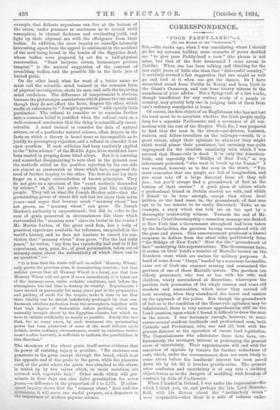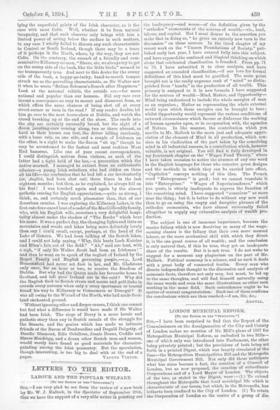CORRESPONDENCE.
"POOR PADDY-LAND !"—I.
[TO THE EDITOR OF TEE " SPECTATOR."] • SIR,--Six weeks ago, when I was considering where I should go for my autumn holiday, some remarks of yours decided me "to give poor Paddy-land a turn" (the phrase is not mine, but that of the first housemaid. I came across in Dublin). When one has been talking and thinking for the last eight years of little else than that "distressful country," it certainly seemed a fair suggestion that one might as well go and look at it when one got the chance. So I have scrambled round from Dublin to Kerry, and from Cork to the Giant's Causeway, and can bear hearty witness to the soundness of your advice. For a flying-visit of a few weeks,. though insufficient for any serious study of a people or country, may greatly help one in judging both of them from one's ordinary standpoint at home.
Of course, the first object of an Englishman who has not lost his head must be to ascertain whether the Irish people really long for a separate Parliament, and a severance of all con- nection with the rest of the Empire. Well, Sir, I was prepared to find that the man in the street—car-drivers, boatmen, waiters, and fellow-travellers on the railways—would, to a great extent, adapt their opinions to whatever they might think would please their questioner, but certainly was quite unprepared for the absolute unanimity with which I was assured that Home-rule is dead. It is only the American- Irish, and especially the "Biddys of New York," so my informants protested, " who want to break up the Union." I was warned, however, as to the man in the street. "You must remember that our people are full of imagination, and you must take off a large discount from all they tell you ; but you'll always find a groundwork of fact at the bottom of their stories." A good piece of advice which a professional friend in Dublin started me with, and which I found to be true enough, except that where local politics or the land came in, the groundwork of fact was apt to be too minute to be easily discerned. Take, as an example, a story which was told me on the spot by a. thoroughly trustworthy witness. Towards the end of Mr. Forster's Chief-Secretaryship a sensation message was flashed to New York that a Government stronghold had been taken by the Invincibles, the garrison having surrendered with all the guns and stores. This announcement produced a liberal response in dollars from the other side, particularly from " the Biddys of New York." Now for the " groundwork a fact " underlying this superstructure. The Government have,, it seems, on their hands a number of Martello towers on the Southern coast which are useless for military purposes. A band of some dozen " bhoys," headed by a notorious Invincible, came out of Cork one summer evening and summoned the garrison of one of these Martello towers. The garrison (am elderly pensioner), who was at tea with his wife and children, wisely surrendered at discretion ; whereupon the patriots took possession of the single cannon and some old muskets and ammunition, which latter they carried off/ next morning, when they abandoned the tower and cannon. on the approach of the police. But though the groundwork of fact as to the condition of the Home-rule agitation may be- infinitesimal, there is very serious apprehension still on the Land question, upon which I found it difficult to draw the man, in the street. I was fortunate enough, however, to come across several resident landlords and professional men, both Catholic and Protestant, who, one and all, look with the ,gravest distrust at the operation of recent land legislation. The Commissioners who administer these Acts have, -un- fortunately, the strongest interest in prolonging the present state of uncertainty. Their appointments will end with the cessation of appeals by tenants for further reductions of rent, which, under the circumstances, does not seem likely to come about before the landlords' interest has been pared down bit by bit till it touches prairie-value. The present utter confusion and uncertainty is at any rate a striking object-lesson as to the dangers of meddling with freedom of contract by Acts of Parliament.
When I landed in Ireland, I was under the impression—for which 1 think you, sir, and perhaps the late Lord Beacons field, with his dictum about the " melancholy ocean " were responsible—that there is a note of sadness under.
lying the superficial gaiety of the Irish character, as is the ease with most Celts. Well, whether it be from natural incapacity, and that each observer only brings with him a limited power of seeing below the surface in such matters, in any case I wholly failed to discern any such characteristic in Central or South Ireland, though there may be a trace .of it perhaps in the North, where, by the way, they are not 47elts. On the contrary, the remark of a friendly and com-
municative Killarney carman, "Shure, sir, we always try to get on the sunny side of the bush, like the little birds," seemed to me transparently true. And next to this desire for the sunny -side of the bush, a happy-go-lucky, hand-to-mouth temper struck me as the prevailing characteristic, as Sir Walter saw it when he wrote "Sultan Solomon's Search after Happiness." Look at the national vehicle, the outside car,—far more national and popular than our hansom. Did any race ever invent a conveyance so easy to mount and dismount from, or which offers the same chances of being shot off at every street corner or turn in the road ? If any reader doubts, let iaim go over to the next horse-show at Dublin, and watch the crowd breaking up at the end of the show. The roads into 'the city are certainly unusually broad, but the sight of a dozen jaunting-cars coming along, two or three abreast, as hard as their horses can trot, the driver lolling carelessly, with a loose rein, on one side, and a couple of Irishmen on the other, is a sight to make the Saxon " sit up," though he may be accustomed to the fastest and most reckless West End hansoms. Like one of your recent correspondents, I could distinguish natives from visitors, as each of the latter had a tight hold of the bar,—a precaution which the native scorned. I managed to extract from an enthusiastic admirer—a young Irish subaltern who had ridden on them all his life—the confession that he had left a car involuntarily (or, Anglic, had been shot out) three times in the last -eighteen months; but then, as he explained, he always fell on this feet ! I was touched again and again by the almost pathetic craving for English appreciation,—quite as strong, I think, as, and certainly much pleasanter than, that of our American cousins. I was exploring the Killarney Lakes, in the first-rate four-oared boat of a cadet of the MacGillicuddy family, who, with his English wife, exercises a very delightful hospi- tality almost under the shadow of "The Reeks" which bear his name. It was a perfect day, the changing lights and tints on mountains and woods and lakes being more delicately lovely than any I could recall, except, perhaps, at the head of the Lake of Geneva. We had been talking of the Scotch lakes, and I could not help saying, " Why, this beats Loch Katrine and Ellen's Isle out of the field." "Ah," said our host, with a sigh, " if only Sir Walter Scott had been an Irishman ! " and then be went on to speak of the neglect of Ireland by the Tloyal Family and English governing people,—e.g., Lord Beaconsfield had never set foot in her, and Mr. Gladstone only once, for an hour or two, to receive the freedom of Dublin. But why had the Queen made her favourite home in Scotland, and left poor Ireland out in the cold ? Why did the English flock to Scotch rivers and moors and golf-links in -crowds every autumn when only a stray sportsman or tourist found his way to Killarney or Connemara or Donegal ? It was all owing to the Wizard of the North, who had made Scot- land enchanted ground.
Without ignoring other and deeper causes, I think one cannot but feel what a difference it would have made if Sir Walter lead been Irish. The siege of Derry is a more heroic and pathetic story than any in Scotch annals of the struggle for the Stuarts, and the genius which has made us intimate friends of the Baron of Bradwardine and Dugald Dalgetty, of Dandie Dinmont, Edie Ochiltree, Jeanie Deans, Caddie and Manse Headrigg, and a dozen other Scotch men and women, would surely have found as good materials for character- painting among the Irish peasantry. Bnt the speculation, though interesting, is too big to deal with at the end of a







































 Previous page
Previous page